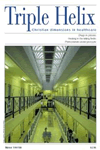Unlike Mickie, many of his fellow inmates have been involved with drugs prior to prison. In a survey of 1,751 sentenced male prisoners, 43% had misused drugs in the six month period before entering prison[1]. Maybe this is not too surprising. It is estimated that as much as 70% of crime, mainly burglary and theft, is perpetrated to fund a drink or drugs habit.
There is increasing concern for the likes of Mickie who are gaining a drug habit whilst inside prison. A National Association for the Care and Resettlement of Offenders report confirms the situation[2], as does an Inspector's report on HMP Styal. Here, inmates and staff reported that drugs were freely available, and that 'a number of inmates were introduced to drugs for the first time and became addicted in Styal. 'Enter a shoplifter, exit an addict.''[3] HMP Styal is a women's prison, but is not untypical.
Drug misuse in prison is causing increasing concern. This has resulted in the introduction of a mandatory drug testing (MDT) programme for prisoners. The types of drugs available inside are as varied as on the outside. For example, in the year to February 1996, 11,749 prisoners were tested under the MDT programme. 2,922 proved positive for cannabis, 616 for opiates, 278 for benzodiazepines, 22 for cocaine, 12 for methadone, seven for amphetamines and two for barbiturates - a total of 3,859. Overall around 30% of prisoners tested positive[4], some for more than one drug.
HM Chief Inspector of Prisons states 'Increasingly we are finding evidence of hard drugs in establishments'[5]. There is anecdotal evidence that as traces of opiate, amphetamine and barbiturate stay in the body for less time than cannabis, prisoners are moving to these drugs to avoid testing positive under MDT[6]. A positive MDT would mean loss of privileges in prison, and adversely affect options for home leave, early release and parole.
The Prison Service hierarchy is concerned about the impact of the drug culture inside. The Inspector has stated that drugs 'pose a threat to good order and compromise the safety of other prisoners and staff. Control is put in jeopardy and there are serious health risks, not only to users but to others as well'[7]. The Director General of the Prison Service has said 'We have a duty of care for the prisoner and, I believe, a moral obligation to offer treatment. We also have a strong practical incentive to do so if we are ever to get prisoners to break out of the circle of drug misuse which causes such problems both inside and outside of prison and all too often turns the prison gate into a revolving door.'[8]
Yet in Styal, as in other establishments, drugs are readily available, and known to be so by local staff. James, an ex-prisoner, says 'Drugs are an omnipresent force in prison, actually cheaper and more easily available than on the outside'[9].
The prison population is now over 62,000 and growing at the rate of 250 per week. Local staff are concerned about the effects of overcrowding, especially rising tensions amongst inmates. On some wings there is tacit understanding that limited drug use is tolerated as it 'keeps the prisoners quiet'. As James says[9] 'It is a sorely tempting route to escape'.
As on the outside there is much debate about harm minimisation and risk reduction. There is a growing lobby promoting a pragmatic approach to the problem, especially with calls for needle exchange schemes. This, despite the recommendations of both the Prison Service's AIDS Advisory Committee in 1995 and more recently the Advisory Council on the Misuse of Drugs (in prison) in 1996. Both bodies considered the feasibility of setting up needle exchanges in prisons, but rejected the idea due to concern that provision of needles 'would more likely lead to an increase in injecting than to a reduction in sharing'[10].
On the fringe of this debate is the growing call for decriminalisation of certain categories of drugs. With prison space at a premium and costing over £400 per week per inmate, maybe this will influence government to reduce the criminality of some drug use.
We, the Christian community, have many issues to face and arguments to be involved with in the whole arena of drug misuse. We need an open and positive debate, and we need it now.
































